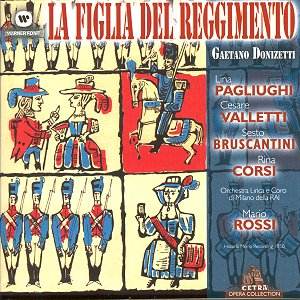Donizetti’s opera has had a chequered history. Its
first performance at the Paris Opéra-Comique was indifferently
received but completely the reverse at subsequent ones. It had only
spasmodic revivals thereafter, such as in 1928 with Toti dal Monte,
then in the 1950 with the soprano featured here, Pagliughi, who committed
it to disc with Cetra, then Sutherland made the role her own to give
the opera a higher profile. There are cuts to some of the secco recitatives
on this recording, which were only added later for Italian performances
anyway, but neither is there any spoken dialogue as in the original
French version. The opera is a simple comedy despite, or indeed because
of its unlikely plot. Maria has been entrusted by her dying father to
Sulpizio, a sergeant in a regiment assigned to a Swiss village. She
and Tonio are in love and he enlists to be near her. Recognised by the
Countess of Berckenfield (a Swiss Beaconsfield perhaps?) as her niece,
she colludes with her guardian to remove Maria from her surroundings
to receive an education suitable for her true position and in preparation
for a more propitious marriage (to the equally unlikely named Duke of
Krakenthorp). Of course she resists and in desperation the Countess
turns to Sulpizio for help, at the same time revealing Maria to be not
her niece but her daughter. Even that fails and Maria is married to
Tonio, by now promoted to an officer.
The music is full of gay melody, plenty of opportunity
for vocal pyrotechnics, its style reminiscent of L’elisir d’amore
by the same composer but with debts to Boieldieu, Auber, Adam, and
of course Rossini. It in turn influenced both Offenbach and Johann Strauss
(there’s hints of Fledermaus - ‘Mein Herr Marquis’ - in the first
act ensemble with Maria and chorus ‘Egli è là’). Pagliughi’s
coloratura shines though her feel for comedy is somewhat straight-laced
in delivery. Valletti has the lightness of vocal touch to match her,
while Bruscantini is well on the road of his wonderful career as a buffo
bass and as dependable as ever. His diction is the best of the lot.
Corsi as the Countess characterises it all in the manner of Marcellina
in Figaro, while Rossi directs an enthusiastic if not always
accurately pitched RAI orchestra and chorus - plenty of military moments
such as side-drums, trumpet calls and ‘Rataplan, rataplan’ male choruses
add to the colourful style of this charming opera.
Christopher Fifield


